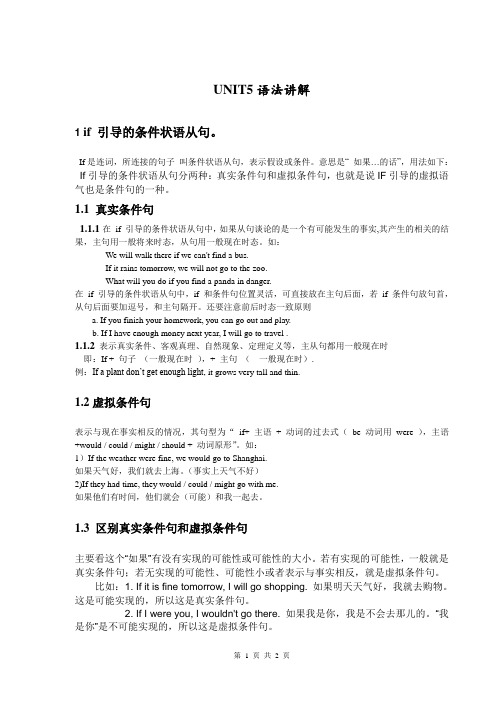名师讲解:if引导的条件状语从句
- 格式:doc
- 大小:17.00 KB
- 文档页数:2

If引导的条件状语从句一、If引导的条件状语从句的结构If+主语+谓语+其它,主语+谓语+其它.=主语+谓语+其它+if+主语+谓语+其它.注:①有if 的是从句,另一个是主句② if 从句在前有逗号,if从句在后无逗号eg.If he runs, he will arrive there in time .=He will arrive there in time if he runs .如果他跑,她将会准时到达.二、if条件句主句和从句的时态,if译为如果1.主句用一般将来时(will+ V-原),if 从句用一般现在时(be用is/am /are ,实义动词用V-原/V-三单), 即主将从现注:①当主语为I ,you, we, they ,复数名词,以及由and连接的两个并列成分等时,实义动词用V-原②当主语为he ,she ,it ,that ,单个人名,单数名词等时,用V-三单)eg .If it is (be) rainy , we will stay(stay) at home .If she studies (study ) hard , she will get (get) good grades .2.若主句中含有情态动词(can/may/ must/may/might/should )时,主句为情态动词+ V-原,if从句用一般现在时eg .We can will go(go) out if it stops (stop ) raining .eg.If you want (want) to get good grades ,you should study (study)hard.3.若主句为肯定祈使句或否定祈使句时,if从句用一般现在时注:以V-原开头的句子是肯定祈使句,否定祈使句在V-原前加Don’teg. Eat (eat) them if you are (be) hungry .eg. Don’t go (not go)to play football if she doesn’t finish (not finish)your homework .拓展:if 还可引导宾语从句,译为“是否”If 引导宾语从句时,时态需根据语境确定,如果主句是一般现在时,从句可以根据具体情况选用时态,如果主句是一般过去时,从句必须跟过去时相关( )1.----Mike wants to know if _________ a picnic tomorrow .----- Yes . But if it _________ , We will visit the museum .A. will you have , will rainB. you will have , will rainC. you will have ,rainsD. will you have , rain( )2.We are not sure if it ____ tomorrow .If it ____ , our sports meeting will be put off .A. will rain , rainsB. rains , will rainC. will rain ; will rain ( )3. ---Can you guess if Mike _______ swimming this afternoon ?---I think he will go with us if he _______ fine .A. will go ,isB. will go ,will beC. goes , isD. goes ,will be答案解析:1.迈克想知道是否你们明天将去野营,if译为是否,引导宾语从句,时态根据语境而定,句末有tomorrow , 所以要用将来时。


知识点名:if引导的条件状语从句讲义:if引导的条件状语从句1. if意为“如果”,引导条件状语从句时,既可放在主句前面,也可放在主句后面。
若if条件句放在句首,从句后面常加逗号与主句隔开。
If you go there, I'll go, too.如果你去那儿,我也会去。
My mother will take me to the park if she is free.如果我妈妈有空,她就会带我去公园。
2. 时态运用:在含有if引导的条件状语从句的主从复合句中,主句为下列情形之一的,条件状语从句通常用一般现在时。
(1) 主句是一般将来时,即遵循“主将从现”的原则。
If he comes, he will bring his violin.如果他来,他就会把他的小提琴带来。
(2) 主句是含有情态动词may/might/can/must/should等的句子。
If you want to lose weight, you must eat less bread.如果你想减肥,你必须少吃面包。
(3) 主句是祈使句。
If you are not strong enough, please don't take part in such an activity.如果你不是很健壮,请不要参加这种活动。
3. 句型转换:(1) 借助“祈使句+and/or+陈述句(一般将来时)”这一句型来转换。
其中,在句意上and表示顺承;or表示转折,意为“否则”。
If you work hard, you'll pass the exam easily.=Work hard, and you'll pass the exam easily.努力学习,你将很容易通过考试。
Work hard, or you won't pass the exam easily.努力学习,否则你不会轻易地通过考试。

UNIT5语法讲解1 if 引导的条件状语从句。
If是连词,所连接的句子叫条件状语从句,表示假设或条件。
意思是“ 如果…的话”,用法如下:If引导的条件状语从句分两种:真实条件句和虚拟条件句,也就是说IF引导的虚拟语气也是条件句的一种。
1.1 真实条件句1.1.1在if 引导的条件状语从句中,如果从句谈论的是一个有可能发生的事实,其产生的相关的结果,主句用一般将来时态,从句用一般现在时态。
如:We will walk there if we can't find a bus.If it rains tomorrow, we will not go to the zoo.What will you do if you find a panda in danger.在if 引导的条件状语从句中,if 和条件句位置灵活,可直接放在主句后面,若if 条件句放句首,从句后面要加逗号,和主句隔开。
还要注意前后时态一致原则a. If you finish your homework, you can go out and play.b. If I have enough money next year, I will go to travel .1.1.2表示真实条件、客观真理、自然现象、定理定义等,主从句都用一般现在时即:If + 句子(一般现在时),+ 主句(一般现在时).例:If a plant don’t get enough light, it grows very tall and thin.1.2虚拟条件句表示与现在事实相反的情况,其句型为“if+ 主语+ 动词的过去式(be 动词用were ),主语+would / could / might / should + 动词原形”。
如:1)If the weather were fine, we would go to Shanghai.如果天气好,我们就去上海。

If引导的条件状语从句很多英语学习者都觉得If引导的条件状语从句这个句型很难,学习起来很吃力。
下面是店铺为你整理的If引导的条件状语从句的相关资料,希望大家喜欢!If引导的条件状语从句用法1.if引导的条件状语从句可以放在主句之前,也可以放在主句之后,如果放在主句之前,中间要用逗号将主句和从句隔开。
例如:If I am free, I will come to see you.= I will come to see you if I am free.如果我有空,我就来看你。
2. 在含if引导的条件状语从句的复合句中,主句用一般将来时,从句通常用一般现在时态表示将来意义,即“主将从现”原则。
例如:If it snows tomorrow, we will go skiing.如果明天下雪,我们就去滑雪。
3. 在含if引导的条件状语从句的复合句中,语句的谓语还可含有情态动词can、must、may等,主句也可是祈使句。
例如:If it stops raining, we can go out.如果雨停了,我们就能出去。
4. 在含if引导的条件状语从句的复合句中,如果主句部分描述的是客观事实或真理,要用一般现在时。
例如:If you heat the ice, it turns into water.如果你加热冰,它就会变成水。
if引导的非真实条件句对过去的虚拟条件从句(if):主语+had done 主句might/would/should/could+have done对现在的虚拟if+ 主语+动词过去式(be用were)主句might/would/should/could+do对将来的虚拟if+主语+动词过去式(be用were)或主语+should do或主语+were to do主句 might/would/should/could+doe.g.Tom got to the station in time because he started earlier.If Tom had started late, he would have missed the train.Do you think the thief entered through the door?No, if he had, I don't believe, he would have broken the living room window.If the book weren't so expensive, I would buy it.If you didn't live so far away, we would be able to visit you more.What would you do if you lost your passport in a foreign country?Why hasn't he come? If he should not come on time, we would have to put off the trip.2.注意事项e.g.If she hadn't work hard at English in the past, she wouldn't work as well as a secretary in a large company now. 混合时间的虚拟语气从句为对过去的虚拟,主句是现在。

if引导的条件状语从句总结(精)if引导的四种条件状语从句一、零条件句/绝对真实条件句(Zero Conditional)零条件句,又叫绝对真实条件句,用于阐述事实。
用来表达在该条件下,结果一定会如此(如规则,客观规律、真理等)。
结构是:If+主语+do/does,主语+do/does。
其从句和主句的谓语动词通常为一般现在时。
二、第一条件句/相对真实条件句(First Conditional)第一条件句又叫相对真实条件句,谈论将来可能发生的事情,并考虑这件事情的结果。
强调偶然性或一次性的条件,也可以与绝对真实条件句同义。
if从句用一般现在时或其他现在时,表示将来可能发生的事情(条件);主句用一般将来时,表示这件事情的结果。
结构是:If+主语+do/does,主语+will do。
三、第二条件句/现在虚拟条件句(Second Conditional)第二条件句是虚拟条件句的一种,即现在虚拟条件句(Unreal Present),用来表达在现在或将来时间下不太可能或不可能发生的条件,这种条件句还可以用来表示试探性的、委婉的语气(可以理解为不大有自信,所以不太真实的条件)。
结构是:①与将来事实相反的非真实条件句是If+主语+should do/were to do/did,主语+would/should/could/might do;②与现在事实相反的非真实条件句是If+主语+did,主语+would/should/could/might+do。
四、第三条件句/过去虚拟条件句(Third Conditional) 第三条件句是表示与过去事实相反的虚拟语气,是用来表达如果(If)当时那样发生,另外一方面(当时)结果会如何。
通常是指过去的事情,带有一切已经太迟而不能够补救的意思。
结构是:If+主语+had done,主语+would/should/could/ might+have done。
if 条件句的时态搭配1.if从句用一般现在时,主句用一般将来时2.if从句用一般现在时,主句用may/might/canIf the fog gets thicker the plane may/might be diverted.3.if从句用一般现在时,主句用must/shouldIf you want to lose weight you must/should eat less bread.4.if从句用一般现在时,主句用一般现在时5.if从句用现在进行时,主句用一般将来时6.if从句用现在完成时,主句用一般将来时If you have finished dinner I’ll ask the waiter for the bill.。
if引导的条件状语从句(包含主将从现原则)一.if的位置:if“如果”,当引导条件状语从句时,既可以放在主句前面,也可以放在主句后面。
若if引导的条件句放在句首,从句后面要加逗号与主句隔开。
例如:My mother will take me to the park if she is free.如果我妈妈有空,她就会带我去公园。
If my mother is free, she will take me to the park.如果我妈妈有空,她将会带我去公园。
(此句if引导的条件状语从句位于句首,主句位于其后,所以要用逗号隔开)二.时态的运用注意:在if的条件状语从句中,主句为下列情形之一时,if条件状语要用一般现在时。
1.主句是一般将来时(主将从现)例如:If he comes, he will tell me all.如果他来了,他会告诉我所有(的事情)。
(这个知识点在初中阶段是常考题,简称“主将从现”——主句是一般将来时态,从句是一般现在时态。
本句中主句是由will引导的一般将来时态的句子,从句是由if引导的一般现在时态的句子,符合主将从现的法则。
)2.主句是含有情态动词may/might/can/must/should等句子。
例如:If you want to lose weight, you must eat less bread.如果你想减肥,你必须少吃面包。
(主句中含有情态动词must,所以if引导的条件状语从句要用一般现在时态。
)3.主句是祈使句例如:If you are not strong enough, please don't take part in such an activity.如果你不够强壮,请不要参加这种活动。
(主句是一个Do型的祈使句,所以根据原则,if从句要用一般现在时态。
——不清楚Do型祈使句的小伙伴可以查看冉老师历史发文记录)三.习题1.If you to be a rich man ,you should try hard.A. wantingB. wantedC. wantD.are want2. If you English, you can be an English teacher.A. likingB. likedC. likeD. are like3. If you like sports , you a PE teacher.A. areB. mustC. can beD. could。
总结好的:IF引导的条件状语从句IF引导的条件状语从句是英语中常见的一种从句,通过if引导一个条件,通常用于表示假设、条件等语境下的情况。
本文将对IF引导的条件状语从句进行全面的总结,包括用法、语法特点、注意事项等方面,以帮助读者更好地掌握这一语法点。
一、用法2.表示可能性:If he comes early, we’ll have time to chat.(如果他早到,我们将有时间聊天。
)3.表示建议:If I were you, I would take a break.(如果我是你,我就休息一下。
)4.表示对过去事实的假设:If he had studied harder, he would have passed the exam.(如果他学得更用心,他就能通过这次考试。
)二、语法特点1.时态:条件从句一般使用一般现在时、一般过去时或过去完成时,而主句则根据实际情况使用对应的时态。
2.语序:条件从句的语序与主句相同,即主语+谓语+宾语。
3.连接词:if是最常用的连接词,但在口语中也可使用unless(除非)或provided that(倘若)等。
4.反意疑问句:在IF引导的条件状语从句中,如果主句使用肯定形式,则条件从句要使用否定形式,反之亦然。
如:If she likes coffee, she’ll drink it, won’t she?(如果她喜欢咖啡,她会喝的,对吗?)5.省略:当从句主语与主句主语相同时,可省略从句主语。
如:If you come, I'll be happy. → If come, I'll be happy.三、注意事项1.区别IF和WHETHER:IF表示条件,而whether表示选择,因此在从句中不能用whether代替if。
2.在条件从句中使用“虚拟语气(subjunctive mood)”,表示假设的情况,一般包括三种情况:(1)表示现在或未来时,使用“would/could/might+动词原形”表示虚拟语气。
if和unless的用法区别条件状语从句一、if的用法(一)基本用法1. if在条件状语从句中表示“如果”,引导的从句可以放在主句之前或之后。
如果从句在主句之前,从句和主句之间要用逗号隔开。
例如: - If I study hard, I will get good grades.(如果我努力学习,我就会取得好成绩。
)- I will go to the park if it is sunny tomorrow.(如果明天天气晴朗,我就去公园。
)2. 在if引导的条件状语从句中,从句要用一般现在时表示将来,而主句可以用一般将来时(will+动词原形)或者情态动词(如can, may, must 等)+动词原形等形式。
例如:- If he has time, he cane to my party.(如果他有时间,他能来参加我的派对。
)- If you see her, tell her I miss her.(如果你见到她,告诉她我想她。
)(二)固定搭配1. if only,意思是“要是……就好了”,表达一种强烈的愿望,后面的句子要用虚拟语气。
例如:- If only I were taller.(要是我再高一点就好了。
)- If only she coulde to the concert with me.(要是她能和我一起去音乐会就好了。
)2. even if,意思是“即使,虽然”,表示让步关系。
例如:- I will go for a walk even if it rains.(即使下雨我也要去散步。
)- Even if he doesn't like me, I still want to be his friend.(即使他不喜欢我,我仍然想成为他的朋友。
)(三)双语例句1. If you love someone, should you tell them?(如果你爱一个人,你应该告诉他们吗?)2. If we don't protect the environment, where will we live in the future?(如果我们不保护环境,我们将来住在哪里呢?)3. If the cat gets out of the house, it might get lost.(如果猫跑出房子,它可能会迷路。